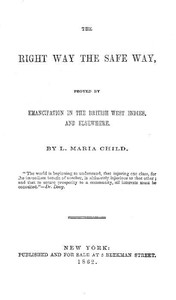The Right Way the Safe Way by Lydia Maria Child
"The Right Way the Safe Way" by Lydia Maria Child is a historical account written in the mid-19th century. The book explores the impact and realities of emancipation in the British West Indies, particularly as it pertains to the lives of enslaved individuals and their former masters. Through a collection of facts and reports, it aims to dispel misconceptions about the economic decline of the colonies post-emancipation, focusing instead on the progress
and improvements in society following the abolition of slavery. At the start of the work, Child sets the stage by outlining the conditions of the British West Indies before the abolition of slavery. She notes that the prevailing narrative of the planters' imminent ruin post-emancipation is misleading, supported by historical reports that reveal a long history of financial distress among plantation owners and a detrimental impact on the enslaved population. Child's argument highlights that while planters were often in economic decline, the enslaved laborers faced severe conditions that were largely ignored. The opening portion emphasizes the complex interplay between economic interests and moral imperatives surrounding slavery, laying the groundwork for a deeper analysis of the outcomes of emancipation as the narrative progresses. (This is an automatically generated summary.)
Read or download for free
| How to read | Url | Size | |||
|---|---|---|---|---|---|
| Read now! | https://www.gutenberg.org/ebooks/50020.html.images | 277 kB | |||
| EPUB3 (E-readers incl. Send-to-Kindle) | https://www.gutenberg.org/ebooks/50020.epub3.images | 136 kB | |||
| EPUB (older E-readers) | https://www.gutenberg.org/ebooks/50020.epub.images | 137 kB | |||
| Kindle | https://www.gutenberg.org/ebooks/50020.kf8.images | 221 kB | |||
| older Kindles | https://www.gutenberg.org/ebooks/50020.kindle.images | 196 kB | |||
| Plain Text UTF-8 | https://www.gutenberg.org/ebooks/50020.txt.utf-8 | 258 kB | |||
| Download HTML (zip) | https://www.gutenberg.org/cache/epub/50020/pg50020-h.zip | 126 kB | |||
| There may be more files related to this item. | |||||
Similar Books
About this eBook
| Adapter | Child, Lydia Maria, 1802-1880 |
|---|---|
| LoC No. | 11006644 |
| Title |
The Right Way the Safe Way Proved by Emancipation in the British West Indies, and Elsewhere |
| Credits |
Produced by Suzanne Shell, Martin Pettit and the Online Distributed Proofreading Team at www.pgdp.net (This file was produced from images generously made available by The Internet Archive/American Libraries.) |
| Reading Level | Reading ease score: 59.5 (10th to 12th grade). Somewhat difficult to read. |
| Language | English |
| LoC Class | E300: History: America: Revolution to the Civil War (1783-1861) |
| Subject | Slavery -- United States |
| Subject | Slavery -- West Indies |
| Category | Text |
| EBook-No. | 50020 |
| Release Date | Sep 20, 2015 |
| Most Recently Updated | Oct 22, 2024 |
| Copyright Status | Public domain in the USA. |
| Downloads | 405 downloads in the last 30 days. |
| Project Gutenberg eBooks are always free! | |

